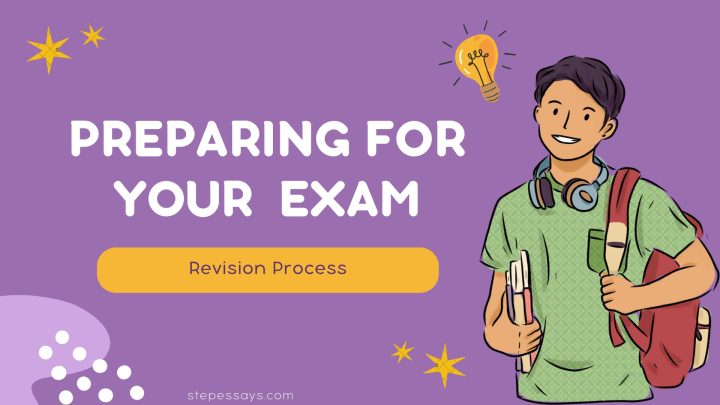Introduction:
Revision is a critical phase in the academic journey that often determines the outcome of exams. Whether you’re preparing for final exams, standardized tests, or any form of assessment, effective revision strategies can make a significant difference in your performance. This comprehensive guide aims to provide you with a detailed roadmap for successful exam revision, covering various techniques, tips, and best practices to maximize your study efforts and achieve your desired outcomes.

Revision
Understanding the Purpose of Revision:
Before looking into revision techniques, it’s essential to understand the purpose behind it. it isn’t basically about memorizing information; rather, it’s a process of reinforcing learning, identifying areas of weakness, and consolidating knowledge. The ultimate goal of revision is to enhance understanding, retention, and application of the material being studied.
Setting Clear Goals:
Effective revision begins with setting clear and achievable goals. Start by identifying the specific topics or subjects you need to revise and break them down into manageable chunks. Set realistic targets for each study session, ensuring that they align with your overall exam preparation timeline. By setting clear goals, you can stay focused, motivated, and track your progress effectively.
Creating a Revision Schedule:
Once you’ve established your goals, create a revision schedule that outlines when and what you’ll study. Consider factors such as your exam dates, the amount of material to cover, and your personal commitments. Allocate dedicated time slots for sessions, making sure to balance your workload and avoid burnout. Be consistent and stick to your schedule, treating it as a priority in your daily routine.
Utilizing Active Learning Techniques:
Passive reading or highlighting alone is not sufficient for effective revision. Instead, engage in active learning techniques that promote deeper understanding and retention of information. Some effective strategies include:
- Summarization: Condense complex concepts into concise summaries or key points, reinforcing your understanding of the material.
- Mind Mapping: Create visual representations of interconnected ideas and concepts, aiding in memory recall and comprehension.
- Practice Testing: Test yourself regularly using past exam papers, quizzes, or flashcards to assess your knowledge and identify areas for improvement.
- Teaching Others: Explain concepts to friends, family members, or study groups, as teaching others reinforces your own understanding and helps fill gaps in knowledge.
Adopting Multi-Sensory Approaches:
Everyone learns differently, so it’s important to explore various learning modalities. Incorporate multi-sensory approaches that appeal to different senses, such as:
- Visual Learning: Use diagrams, charts, and graphs to visualize information and aid in comprehension.
- Auditory Learning: Record yourself reciting key concepts or listening to educational podcasts related to your subject matter.
- Kinesthetic Learning: Engage in hands-on activities or simulations that involve physical interaction with the material, promoting active learning and memory retention.
Managing Time Effectively:
Time management is crucial during the revision period to ensure you cover all necessary material without feeling overwhelmed. Break down your sessions into manageable time blocks, allowing for short breaks to maintain focus and productivity. Prioritize topics based on their importance and your level of understanding, dedicating more time to challenging areas while reviewing familiar material efficiently.
Minimizing Distractions:
Create a conducive study environment free from distractions to optimize your revision sessions. Find a quiet, comfortable space where you can concentrate without interruptions from noise, electronic devices, or other distractions. Consider using productivity tools or apps to block social media, emails, or other tempting distractions during study sessions, allowing you to maintain focus and concentration.
Taking Care of Yourself:
Amidst the demands of exam preparation, don’t overlook the importance of self-care. Prioritize your physical and mental well-being to ensure optimal performance during revision and exams. Get an adequate amount of sleep each night, eat nutritious meals, and engage in regular exercise to boost energy levels and reduce stress. Practice relaxation techniques such as deep breathing, meditation, or yoga to alleviate anxiety and promote mental clarity.
Seeking Support:
Don’t hesitate to seek support from teachers, tutors, or classmates if you encounter difficulties during the revision process. Reach out for clarification on challenging topics, request feedback on your progress, or participate in study groups for collaborative learning. Additionally, consider seeking emotional support from friends or family members to stay motivated and maintain a positive mindset throughout the revision period.
Staying Flexible and Adaptable:
Revision is a dynamic process that may require adjustments based on your progress, feedback, or changing circumstances. Stay flexible and adaptable in your approach, willing to modify your revision strategies as needed to address challenges or improve effectiveness. Be open to experimenting with new techniques, seeking feedback from others, and refining your study methods to optimize your learning experience.
Conclusion:
Effective exam revision is a strategic endeavor that requires careful planning, active engagement, and perseverance. By adopting a systematic approach, utilizing a variety of revision techniques, and prioritizing self-care, you can maximize your study efforts and achieve success in your exams. Remember to stay focused, stay motivated, and believe in your ability to overcome challenges and reach your academic goals. With dedication and determination, you can approach exams with confidence and excel in your academic endeavors.
